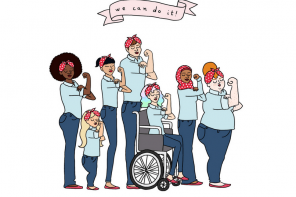Sisterhood. If you have a sister or a best friend, chances are you have felt the bond of togetherness, joy, peace, and love. There’s another type of sisterhood too, one rarely mentioned today: religious life.
Sisters choose a life that is entirely countercultural, especially today. And, as society does with anything that is countercultural, we have a reality show now so everyone can marvel at it. Lifetime’s new reality show The Sisterhood, which premiered this week, follows five young women as they discern religious life.
Another example of this countercultural reality-TV trend is TLC’s Breaking Amish. Perhaps there’s something appealing about watching the strictness of the life Amish and religious life, especially to a culture with an “I go my own way” mentality.
Religious life is a (usually Catholic) vocation where a person undertakes the “evangelical counsels” of poverty, chastity, and obedience. Women specifically give up the option of becoming mothers and wives, renouncing their worldly possessions—think Maria Von Trapp in the Sound of Music.
The Amish reject technology, vanity, and modern comforts, eschewing these for the more traditional values of hard labor, family life, and religious piety. So too, the Catholic religious vow to give up the goods of the world, the goods of marriage, and to surrender their will to God’s. Active religious Sisters generally have some sort of service outside of their convents, while the chief work of nuns is prayer inside the convent.
I sat down with two Dominican Sisters at Ave Maria University—Sr. Albert Marie possessing her PhD and Sr. Maria Veritas studying for her MA, having received her undergraduate degree from Harvard—to discuss their experience living in what many consider two separate worlds.
The two Sisters are young, joyful, and beautiful women. Many people picture Sisters as old women with dour dispositions—and why would they think differently, when today, we rarely see Sisters in person. They’re simply not as visible as they once were, playing into the perception of religious life as counter to the culture of independence.
For these women, part of the appeal of religious life is that in the community helps you develop your individuality in an authentic way. As Sr. Maria Veritas explains, the community of Sisters is like a “huge mosaic: no tile is the same. There is only one of you. We take pleasure, delight, and joy in our unity as a community—wearing the same habit, having the same schedule. That can look like cookie cutter sameness on a superficial level, but on a deeper level it is anything but. It is true for any woman—your uniqueness is more who you are, not what you wear.”
Many communities offer retreats for women, guided or unguided, silent or with dialogue. There is a palpable sense of peace. You remove yourself from the constant connection and stimulation of technology. You have to come face to face with yourself—a face washed entirely clean of guile and deception. For some people, this is difficult. For others, it’s finding the version of yourself that you’ve been searching for your whole life.
The washing of the face is not just metaphorical but actual as well. In the promo for The Sisterhood, we see an approaching meltdown when the girls are made to take off their makeup. However, as Sr. Albert Marie explains, “When women wear makeup, they do it to make themselves look beautiful and appropriate for different occasions—a class, a special get together, an outdoor outing. As religious Sisters, not ever wearing makeup expresses the poverty and simple beauty of our vocation.”
The tenets of religious life, while different than mainstream culture, do not by any means divorce it from the world. The Sisters insist that marriage, possessions, and independence are not evil, but rather they give them up to focus on service to God and others, viewing God as the greatest good. The Sisters don’t see themselves as giving up the essence of what it is to be a woman—loving and giving life. They understand themselves as taking up the challenge of “spiritual motherhood” through their prayers, teaching, and union with Christ.
When they were discerning religious life but before they entered the convent, the Sisters had to deal with the same dilemmas surrounding dating relationships that all women have to face. Sr. Albert Marie did go out with some of her male friends but broke things off before they became serious. She compared discerning religious life while cultivating another relationship to very seriously dating two men at the same time—it wouldn’t work. When they first entered the convent, the Sisters struggled to adjust from the flexible hours of a college student to that of a more rigorous community schedule, just as newly graduated students adjust to life in the working world.
And just as our families have to come to terms with the idea of us moving away from home to pursue a job, so too did the Sisters’ families go through a period of adjustment—perhaps even more than ours. No matter how supportive or faithful families are, it is invariably difficult to have a daughter enter religious life, learn to call her by a new name, and become used to the idea that she is no longer readily available to them. But they adjust. Sr. Albert Marie’s family now feels “they’re connected to the whole community! It’s like the Sisters are their in-laws, in a sense.” Community becomes your family.
According to Sr. Maria Veritas, “Once you’re in the life, you’re just so happy and you love it. All that sacrifice…you don’t count it as sacrifice.” As Mother Teresa said, “I have found the paradox: if you love until it hurts, there can be no more hurt, only more love.” What could be better than love without hurt?
In a culture where more people are looking out for Numero Uno and marriages are at an all-time low with divorce rates at an all-time high, love without hurt doesn’t seem to be an option. Seeing people, both Amish and religious, living an existence devoid of the present pressures that we are so attuned to is a refreshing experience as we imagine what life would be like without technology. Rather than being divorced from the world, the Sisters have a connection to the real heartbeat of the world and themselves—even if it’s different from the pulsing bass of current culture.
Siobhan Fagan is a senior theology major at Ave Maria University. When she’s not reading for class, you can find her swing dancing, Skyping her family, and writing. Her dream is to one day live in a place with wide open spaces–preferably in a colder climate than Florida.
Anyone interested in finding out more about religious life can go to http://www.cmswr.org.
Photo Credit: Xinem





